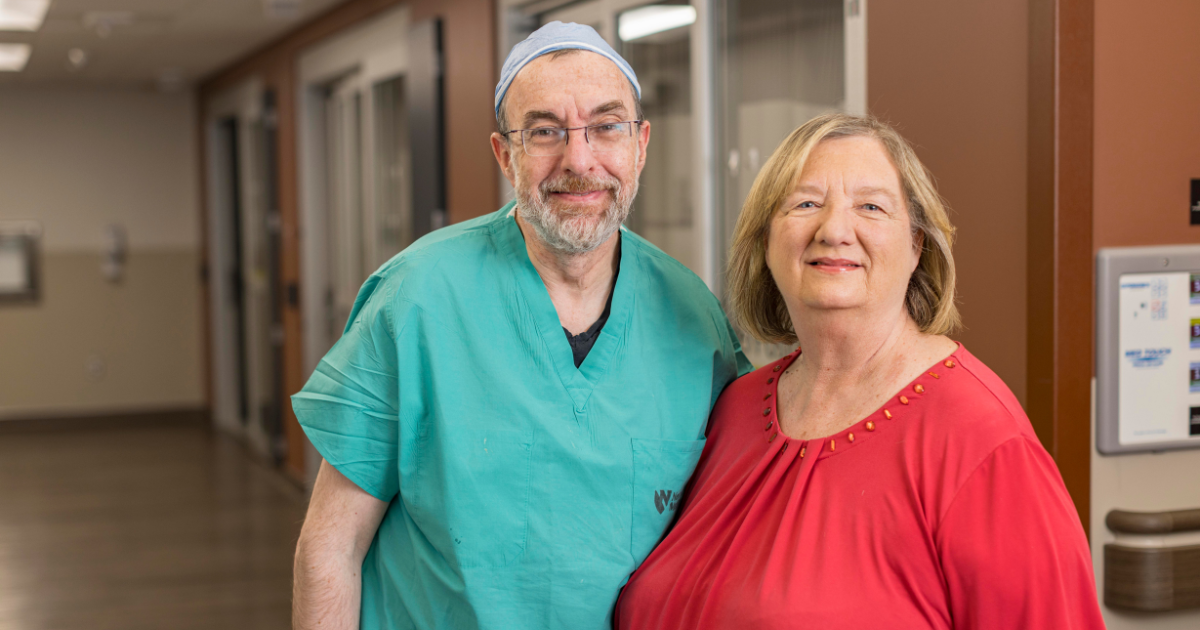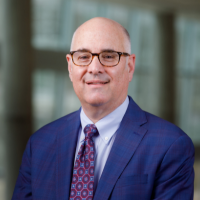Breathing easy again

Nancy McCabe had been feeling more tired than usual for several weeks. She didn’t realize how bad it had gotten until one day when she arrived home; she was so tired she couldn’t walk up three flights of stairs to her apartment.
“I got out of my car two times, and both times, I got back in,” recalls McCabe. “I felt extremely exhausted. After I got back in the car the second time, I called my daughter and asked her to come get me and take me to the hospital.”
Her children suggested calling an ambulance, but Nancy insisted they drive her. “I wanted to go to the Nebraska Medical Center,” she says. “I knew if we called an ambulance, they would have taken me to a different hospital that was closer.”
Her daughter called ahead to let them know they were on their way.
“When we got there, a team of doctors and nurses were waiting,” says McCabe. “They immediately took me to a treatment room and started working on me.”
A CT scan revealed McCabe had a saddle pulmonary embolism – a blockage in one of the pulmonary arteries in the lungs. The blockage restricts blood flow to the lungs, lowers oxygen levels and increases blood pressure in the pulmonary arteries. It can cause heart and lung damage and even death.
A saddle pulmonary embolism is a larger, more unstable, life-threatening blood clot that forms where the main pulmonary artery branches off into a “Y” shape and goes into each lung. The situation requires swift emergency treatment.
McCabe was admitted to the intensive care unit and put on oxygen and blood thinners.
“The doctor told me I was in critical condition and had a 20% chance of making it through the night,” recalls McCabe.
It was early June 2020, and the COVID-19 pandemic was in full swing. Additional tests determined that McCabe also had fallen victim to the virus. Neither of her children could come into her room to see her that night or for the next two weeks.
McCabe says she hardly slept. She and her children texted throughout the night.
She remembers watching the sun come up the next morning and thinking, “I’m still alive.”
Her clots appeared to be responding to medications and were dissipating. After she passed the critical period, McCabe was moved to a room for recovery and was isolated for the next 12 days due to her COVID-19 infection. She was then able to go home.
By the end of July, McCabe says she was feeling better but still could only walk about a block before being out of breath. She was referred to Ronald Zolty, MD, Nebraska Medicine advanced heart failure and transplant cardiologist. Dr. Zolty performed additional testing that revealed the clots had not dissolved completely, causing a lack of oxygen to the lungs.
Dr. Zolty diagnosed McCabe with a rare form of pulmonary hypertension called chronic thromboembolic pulmonary hypertension, also referred to as CTEPH. Pulmonary hypertension is a chronic condition that occurs when not enough oxygen-rich blood is pumped into the lungs, causing high pressure in the lungs and low oxygen levels. CTEPH is caused by chronic blockage of the primary lung arteries due to blood clots or scarring of the vessels.
Nebraska Medical Center is one of less than 60 centers in the country that has been named a Pulmonary Hypertension Center of Excellence, meaning the medical center has special expertise in treating pulmonary hypertension.
“Pulmonary hypertension is difficult to diagnose because symptoms are often vague and similar to many other conditions,” explains Dr. Zolty. “It is often diagnosed by ruling out other diseases.”
Symptoms may include shortness of breath, chest pain, swelling in the legs, fatigue, stomach bloating and passing out as the disease progresses.
The only possible cure for CTEPH is a surgical procedure called pulmonary thromboendarterectomy that removes any remaining clots and scarring in the lining of the pulmonary arteries. Nebraska Medicine thoracic and cardiac surgeons Michael Moulton, MD, and Aleem Siddique, MBBS, performed the procedure on McCabe in February 2021. Dr. Moulton has been doing the surgery for 30 years. He and Dr. Siddique are the only surgeons in the region that perform the procedure.


“It is very successful for the majority of patients,” says Dr. Moulton. “If Nancy had not had the surgery, she probably would have developed right-sided heart failure within a couple of years. Since the surgery, Nancy is doing extremely well, and we expect her to continue to do very well over the long term.”
“I had gotten so used to feeling tired and fatigued that I didn’t realize how good I could feel until after the surgery,” says McCabe. “Going to the grocery store or to my grandkids’ sporting events used to be exhausting, and sometimes I just couldn’t do it. Now I can walk faster and longer, I don’t feel so tired during the day, and I can do so much more with my family and grandkids.”
McCabe retired this past summer and says she is busier than ever. She says she owes her new energy and vitality to the care she received at Nebraska Medical Center. She is forever grateful that she insisted on coming here two years ago when this all started.
“The care was absolutely excellent, from the doctors to the nursing staff to the cleaning staff,” says McCabe. “They all treated me with such care and respect. I totally trust them, and I believe in them, and now I tell everyone to go to the Nebraska Medical Center.”
Call 800.922.0000 to schedule an appointment with one of our specialists to get expert care from the only Pulmonary Hypertension Center of Excellence in the region.






